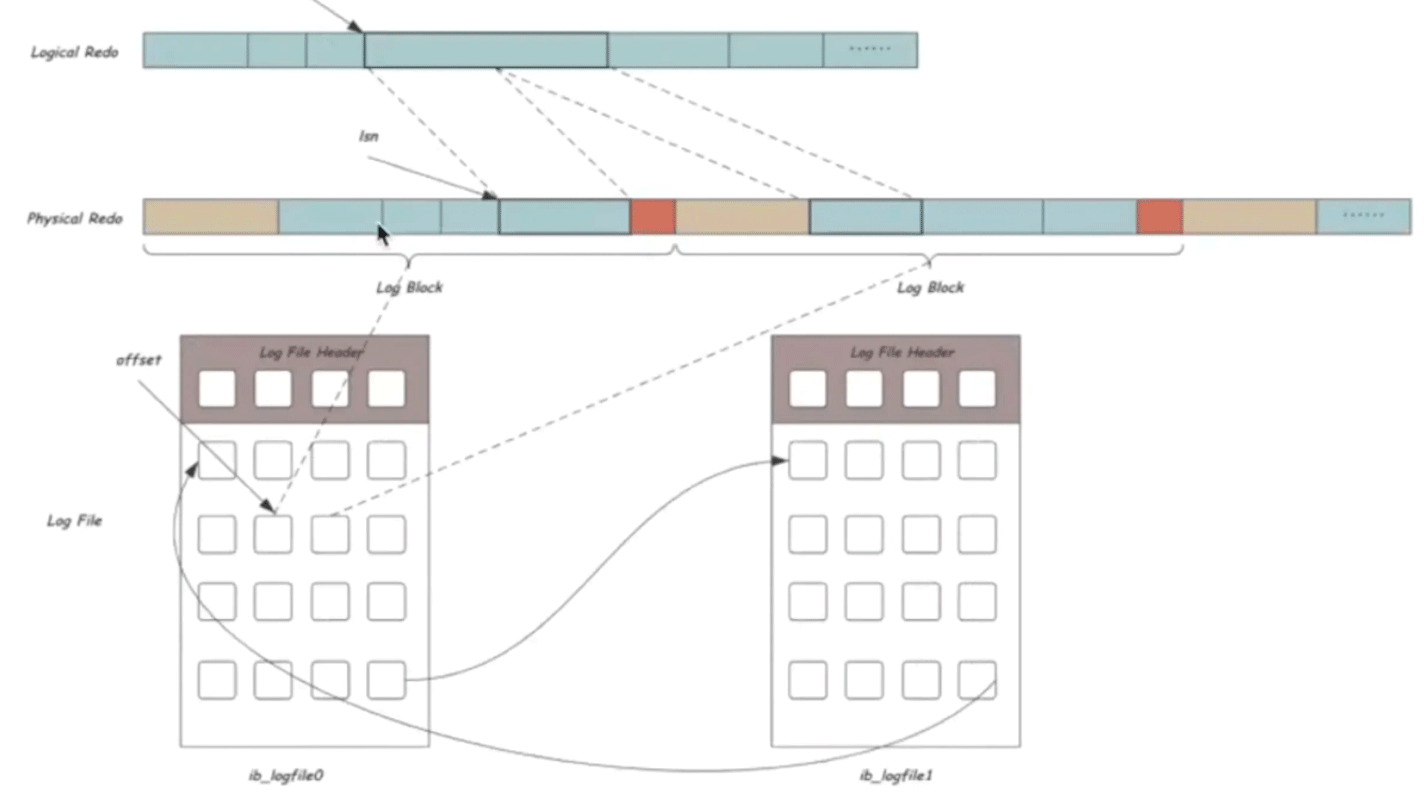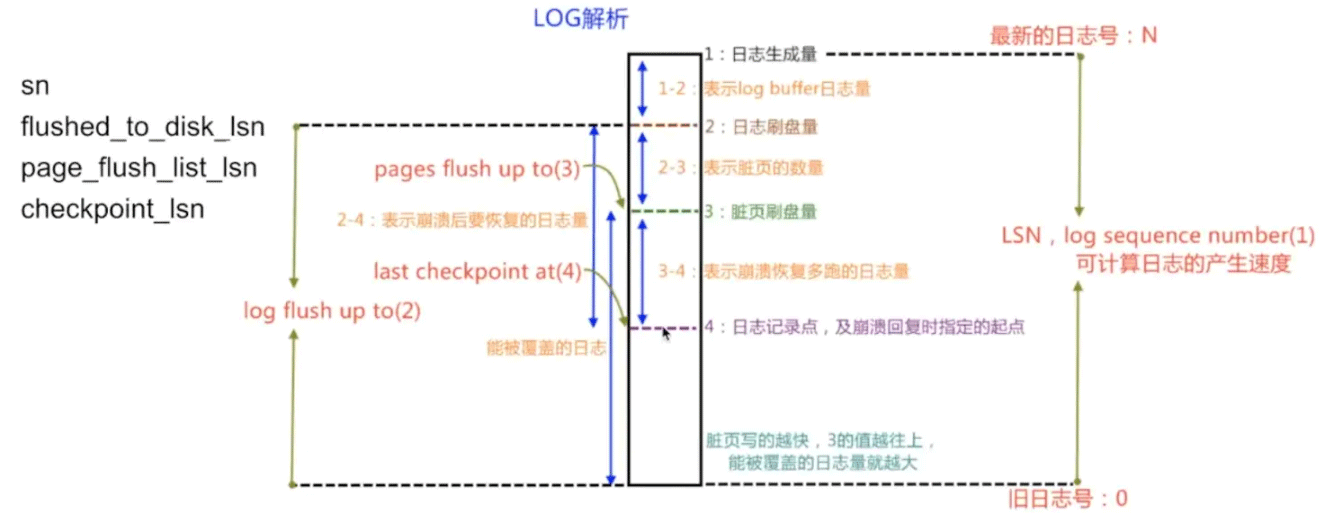What are MySQL Redo and Undo logs?
1. Introduction to Redo log
Redo log is a physical log that records page changes.
1.1 The role of Redo log
Improve database writing efficiency
Ensure that the database does not lose data and perform data recovery
1.2 Redo log format and type
The so-called REDO organization method is how to record the required REDO content into the disk file to facilitate efficient REDO writing , read, restore and clean. We divide REDO into three layers from top to bottom: logical REDO layer, physical REDO layer and file layer.
Logical REDO layer
This layer is the real REDO content, a sequential data flow, REDO consists of multiple REDO records are connected at the end and have a globally unique incremental offset sn. InnoDB will maintain the maximum value of the current sn in the global log_sys and increase the sn by the REDO content length each time data is written.
Physical REDO layer
The disk is a block device. InnoDB also uses the concept of Block to read and write data. The length of a Block is equal to OS_FILE_LOG_BLOCK_SIZE The size of a disk sector is 512B, and the smallest unit of each IO read and write is a Block.
File layer
Eventually REDO will be written to the REDO log file, and the log file is written in a loop

2. The process of writing Redo logs (MTR)
The operations of the user thread will first be written to the
log bufferThe logs inlog bufferwill be written sequentially to the Redo logical logand then will be written to disk for persistence. Store to disk
Notify the user that the storage is completed
3. Checkpoint mechanism
Checkpoint is The marking bit of dirty pages in the Redo log has the following two functions:
Maintain the Redo log to facilitate cleaning
Reduce Restart workload

Database recovery process:
Read checkpoint Information•Read the remaining logs starting from the checkpoint position
Parse the log and build a hash table according to space_no and page_id
Apply Redo log, Redo Log playback ensures idempotence
Parse binlog and build xid list
Scan the rollback segment to build a list of pending transactions
Roll back transactions that are not in the xid list
4. Introduction to Undo log
The Undo log is a logical log that records the incremental changes of data, and its function is to ensure the atomicity of transactions and transaction concurrency control. Rewritten: The Undo log serves to guarantee the atomicity of transactions and control their concurrency by logging the incremental changes in data, functioning as a logical log.. It can be used to roll back transactions, implement multi-version control (MVCC), and resolve read-write conflicts and consistent reads.
5. MVCC
The meaning of MVCC:
- ##Reading and writing do not block each other;
- Reduce the probability of deadlock;
- Achieve consistent reading.
The role of UndoLog in MVCC:
- ##Each transaction has a single-increment transaction ID;
- The row record of the data page contains DB_ROW_ID, DB_TRX_ID, DB_ROLL_PTR;
- DB_ROLL_PTR concatenates all snapshot records of the data row through the linked list structure stand up.
The above is the detailed content of What are MySQL Redo and Undo logs?. For more information, please follow other related articles on the PHP Chinese website!

Hot AI Tools

Undresser.AI Undress
AI-powered app for creating realistic nude photos

AI Clothes Remover
Online AI tool for removing clothes from photos.

Undress AI Tool
Undress images for free

Clothoff.io
AI clothes remover

Video Face Swap
Swap faces in any video effortlessly with our completely free AI face swap tool!

Hot Article

Hot Tools

Notepad++7.3.1
Easy-to-use and free code editor

SublimeText3 Chinese version
Chinese version, very easy to use

Zend Studio 13.0.1
Powerful PHP integrated development environment

Dreamweaver CS6
Visual web development tools

SublimeText3 Mac version
God-level code editing software (SublimeText3)

Hot Topics
 1389
1389
 52
52
 How to open phpmyadmin
Apr 10, 2025 pm 10:51 PM
How to open phpmyadmin
Apr 10, 2025 pm 10:51 PM
You can open phpMyAdmin through the following steps: 1. Log in to the website control panel; 2. Find and click the phpMyAdmin icon; 3. Enter MySQL credentials; 4. Click "Login".
 MySQL: An Introduction to the World's Most Popular Database
Apr 12, 2025 am 12:18 AM
MySQL: An Introduction to the World's Most Popular Database
Apr 12, 2025 am 12:18 AM
MySQL is an open source relational database management system, mainly used to store and retrieve data quickly and reliably. Its working principle includes client requests, query resolution, execution of queries and return results. Examples of usage include creating tables, inserting and querying data, and advanced features such as JOIN operations. Common errors involve SQL syntax, data types, and permissions, and optimization suggestions include the use of indexes, optimized queries, and partitioning of tables.
 How to use single threaded redis
Apr 10, 2025 pm 07:12 PM
How to use single threaded redis
Apr 10, 2025 pm 07:12 PM
Redis uses a single threaded architecture to provide high performance, simplicity, and consistency. It utilizes I/O multiplexing, event loops, non-blocking I/O, and shared memory to improve concurrency, but with limitations of concurrency limitations, single point of failure, and unsuitable for write-intensive workloads.
 Why Use MySQL? Benefits and Advantages
Apr 12, 2025 am 12:17 AM
Why Use MySQL? Benefits and Advantages
Apr 12, 2025 am 12:17 AM
MySQL is chosen for its performance, reliability, ease of use, and community support. 1.MySQL provides efficient data storage and retrieval functions, supporting multiple data types and advanced query operations. 2. Adopt client-server architecture and multiple storage engines to support transaction and query optimization. 3. Easy to use, supports a variety of operating systems and programming languages. 4. Have strong community support and provide rich resources and solutions.
 MySQL's Place: Databases and Programming
Apr 13, 2025 am 12:18 AM
MySQL's Place: Databases and Programming
Apr 13, 2025 am 12:18 AM
MySQL's position in databases and programming is very important. It is an open source relational database management system that is widely used in various application scenarios. 1) MySQL provides efficient data storage, organization and retrieval functions, supporting Web, mobile and enterprise-level systems. 2) It uses a client-server architecture, supports multiple storage engines and index optimization. 3) Basic usages include creating tables and inserting data, and advanced usages involve multi-table JOINs and complex queries. 4) Frequently asked questions such as SQL syntax errors and performance issues can be debugged through the EXPLAIN command and slow query log. 5) Performance optimization methods include rational use of indexes, optimized query and use of caches. Best practices include using transactions and PreparedStatemen
 Monitor Redis Droplet with Redis Exporter Service
Apr 10, 2025 pm 01:36 PM
Monitor Redis Droplet with Redis Exporter Service
Apr 10, 2025 pm 01:36 PM
Effective monitoring of Redis databases is critical to maintaining optimal performance, identifying potential bottlenecks, and ensuring overall system reliability. Redis Exporter Service is a powerful utility designed to monitor Redis databases using Prometheus. This tutorial will guide you through the complete setup and configuration of Redis Exporter Service, ensuring you seamlessly build monitoring solutions. By studying this tutorial, you will achieve fully operational monitoring settings
 How to view sql database error
Apr 10, 2025 pm 12:09 PM
How to view sql database error
Apr 10, 2025 pm 12:09 PM
The methods for viewing SQL database errors are: 1. View error messages directly; 2. Use SHOW ERRORS and SHOW WARNINGS commands; 3. Access the error log; 4. Use error codes to find the cause of the error; 5. Check the database connection and query syntax; 6. Use debugging tools.
 How to connect to the database of apache
Apr 13, 2025 pm 01:03 PM
How to connect to the database of apache
Apr 13, 2025 pm 01:03 PM
Apache connects to a database requires the following steps: Install the database driver. Configure the web.xml file to create a connection pool. Create a JDBC data source and specify the connection settings. Use the JDBC API to access the database from Java code, including getting connections, creating statements, binding parameters, executing queries or updates, and processing results.




